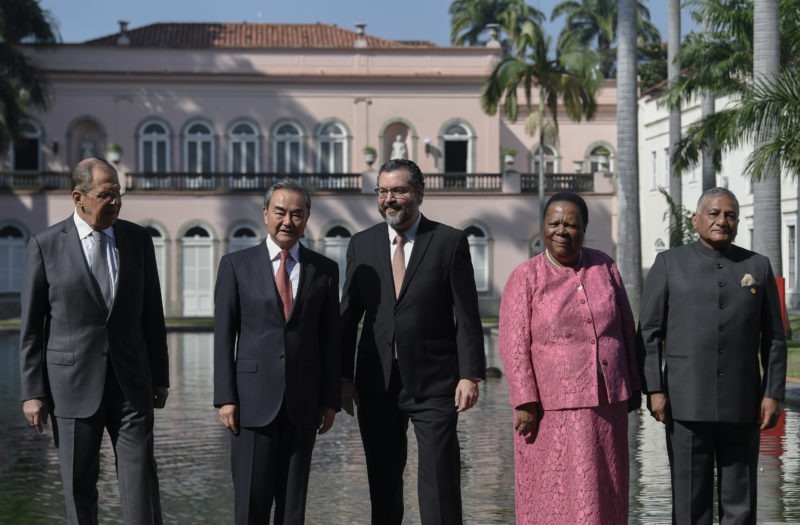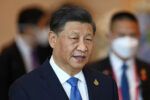Brazil calls on BRICS to heed ‘cries’ of Venezuelans
(L to R) The BRICS foreign ministers — Russia’s Sergey Lavrov, China’s Wang Yi, Brazil’s Ernesto Araujo and South Africa’s Grace Naledi Mandisa Pandor, along with Indian Transport Minister Vijay Kumar Singh, pose for a picture in Rio de Janeiro (MAURO PIMENTEL)
Rio de Janeiro (AFP) – Brazil’s Foreign Minister Ernesto Araujo on Friday pleaded with the country’s partners in the BRICS group of emerging economies to heed the “cries” of Venezuelans and work together to end the crisis.
Araujo made the remarks at a meeting with his counterparts from Russia, India, China and South Africa in Rio de Janeiro.
The group is deeply divided over how to respond to a situation that has forced millions of Venezuelans to flee their collapsing economy.
Brazil is the only BRICS member to recognize Venezuela’s opposition leader Juan Guaido as the legitimate acting president.
Russia and China still support Nicolas Maduro’s socialist government.
“Venezuelans are crying for freedom,” Araujo told the meeting, which comes in the run-up to a leaders’ summit in November in the Brazilian capital of Brasilia.
“We are hearing those cries in Brazil. The international community needs to hear these cries to do something and to act.”
But Russian Foreign Minister Sergei Lavrov reiterated Moscow’s opposition to “interference from the outside.”
“We need to use the international law as the foundation and to support the Venezuelans into coming to the solution themselves,” Lavrov said.
There was no mention of Venezuela in the agreed joint statement issued at the end of the BRICS meeting, underscoring the discord.
Lavrov’s comments come as the United States considers imposing new sanctions on Russia over its support for Maduro, the White House representative for the South American country said Wednesday.
The Lima Group of a dozen Latin American countries and Canada, which is helping to mediate the Venezuelan crisis, on Tuesday urged the world to push Caracas to hold new presidential elections.
Venezuela was thrust into a political impasse six months ago when Guaido declared himself acting president after branding Maduro a “usurper” because of his “fraudulent” 2018 re-election.
Talks between the government and the opposition are stalled as Guaido, recognized by more than 50 countries, is demanding that Maduro step down and new elections be held.
– No issue with China –
Araujo batted away concerns about Brazil’s relations with China, its biggest trade partner.
Many had feared ties could rupture under newly-elected President Jair Bolsonaro, whose previous criticisms of Beijing and fervent admiration of US President Donald Trump are shared by Araujo.
“We never had any issue with China,” Araujo told reporters a day after sitting down with his Chinese counterpart Wang Yi for the first time.
“We had an issue with the way Brazil was organizing, or not organizing, its relations with China.”
Closer ties with China were encouraged under leftwing former president Luiz Inacio Lula da Silva, who is in jail for corruption.
During last year’s election campaign, however, Bolsonaro accused the world’s second largest economy of “buying Brazil” and antagonized Chinese leaders by visiting Taiwan, considered a renegade province by Beijing.
Since taking power in January Bolsonaro has sought to deepen relations with like-minded conservative governments in the United States and Israel as he pivots away from developing countries.
But Brazil’s economic slowdown and pressure from its powerful mining and farming sectors, which depend on China to buy their iron ore and soya bean exports and are influential backers of Bolsonaro, have buffered the relationship.
Brazil’s closer ties with the United States would not be to the detriment of China.
“We don’t have a logic here of either or,” Araujo said.
“China always negotiated very well… we just think that Brazil has to do better work in those negotiations.”
Disclaimer: Validity of the above story is for 7 Days from original date of publishing. Source: AFP.


